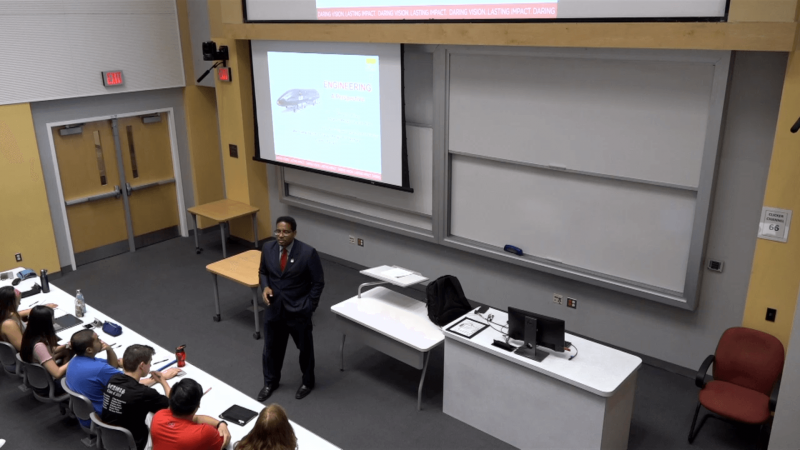
I had never heard of the 14 Grand Challenges before, but I see now how important it is to solve those challenges. The world is evolving faster than it ever has before, and engineers need to start solving problems that impact society as a whole, and not just for the sake of capitalism.
Name: Jwoyal Ranjit
Major: Aerospace Engineering
Can you share a description of the experience? ENES181 is formally titled "Engineering & The Grand Challenges", but it's taught by the Dean of the Clark School of Engineering, so it's also called Dialogue with the Dean! Specifically, the class explains what engineering is within the context of the NAE's 14 Grand Challenges for Engineering, and every week there is a guest presenter from a different department or organization within the Clark School who speaks about a different engineering discipline in relation to those Grand Challenges.
What was the most impactful part of the experience? The one major assignment for this course is the Technology Paper, a research paper all about a new emerging technology of your choice. It sounds daunting at first, but it's really not that bad if you choose a topic that you're passionate about! I've always been interested in the field of space propulsion, so I decided to write my paper about electric propulsion systems and how they can be much more efficient and sustainable compared to conventional rockets. The knowledge I gained from doing this research even helped me to land my current position—I now work under a postdoctoral researcher at UMD's Space Power & Propulsion Lab doing work with plasma propulsion systems!
What surprised you? When you're someone who's had their eyes focused on just one of the engineering departments here for the longest time, you might develop a sort of "tunnel vision" with respect to the major that you've chosen. Some of the work that other engineering departments are doing right now is absolutely incredible, and it was really eye-opening to be exposed to it! Bioengineering is 3D printing complex tissues, ECE is reverse engineering the human brain, Materials Science is making fuel cells that are incredibly dense and powerful; the list goes on and on.
Did you make any personal connections with your peers, industry professionals, faculty or staff? Our Clark Scholars cohort got to know Dean Pines better than we already did, and some students were even able to network with the guest speakers on a much closer level. To name a few, one of us is now doing research with Dr. Deb Niemeier and her work on water quality issues in America, and another has gotten involved with the Bioinspired Advanced Manufacturing Lab. Of course, the 10 of us were able to bond over working on the Technology Paper together!
What were your major takeaways? What did you learn? Likely the most important takeaway from this class for me was Dr. C. Dan Mote Jr.'s definition of an engineer: "Engineers create solutions for people and society." I had never heard of the 14 Grand Challenges before, but I see now how important it is to solve those challenges. The world is evolving faster than it ever has before, and engineers need to start solving problems that impact society as a whole, and not just for the sake of capitalism.
Have your career or academic goals changed as a result of this experience? Before I started my first semester here, my original game plan was to go straight into the aerospace industry or a government job. However, thanks in part to the research that I did for the Technology Paper, I learned that I really want to continue doing research, and so I will most likely end up pursuing a Master's degree after I graduate.
Top